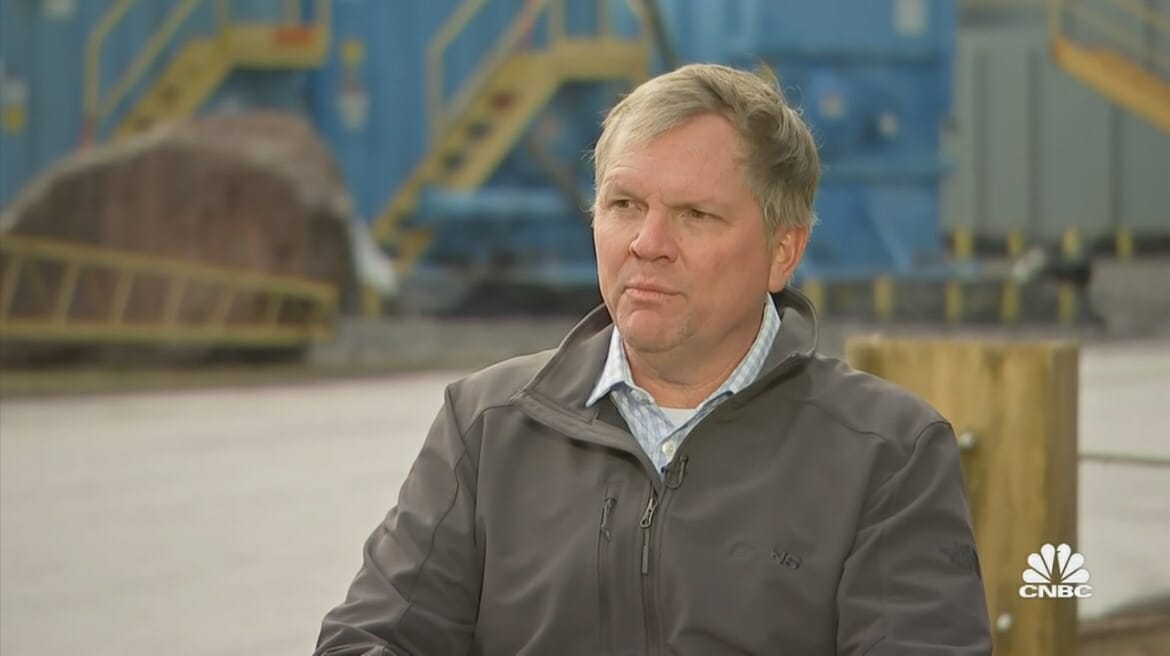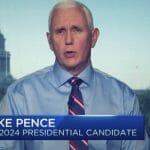Following is the unofficial transcript of a CNBC interview with Norfolk Southern Corp (NYSE:NSC) CEO Alan Shaw on CNBC’s “Closing Bell: Overtime” (M-F, 4PM-5PM ET) today, Tuesday, February 21st.
Norfolk Southern CEO Alan Shaw Discusses East Palestine Derailment
Part I
MORGAN BRENNAN: I sat down with Norfolk Southern CEO Alan Shaw for a first on CNBC interview. We began the discussion by asking him about the cause of the crash and the video that has circulated showing wheels shooting off sparks 20 miles away from the actual site of the derailment and specifically why the train system didn’t send an alert. Take a listen.
Q4 2022 hedge fund letters, conferences and more
ALAN SHAW: I'm I'm really prohibited from talking about this—
BRENNAN: Okay.
SHAW: While it's under NTSB investigation. We're fully cooperating with the NTSB and the FRA. We're gonna get to the root cause of this. And if changes need to be made, we'll implement those changes. Right now, my focus—
BRENNAN: Understood.
SHAW: Is on the citizens of this community.
BRENNAN: Okay. So three days after the derailment, the decision was made to do a controlled release, controlled burn of some of those tank cars that did hold toxic chemicals including some that are, are, are, are known carcinogens. Why did that need to happen and who decided that that was the way it should happen?
SHAW: So I was here when that decision was made, you know. I was with unified command, and Governor DeWine, Governor Shapiro, and Mayor Conaway, and Fire Chief Drabek, and the National Guard were all aligned that this was the right decision to make in terms of public safety.
You know, the the fact that we knew at that time that the pressure release valves on the cars had failed, the temperatures were rising, caused our independent expert to become very concerned about the potential for an uncontrolled explosion that would shoot harmful gas and shrapnel into a populated community.
So our independent consultant and the Ohio EPA recommended to unified command for a controlled burn and a controlled release. Now, the goal of that was to burn off the harmful chemicals. We had air, air monitoring in place before, during, and after. And that was that air monitoring did not pick up any traces of those toxic chemicals.
Look, I was here. I I know I saw it. I know how it looked. It was scary, you know. I'd, I'd never seen anything like that, and I know the citizens of this community had never seen anything like that. So I, I know how it looked, and I know how it could scare folks.
I also know that, based on the test results, it was done in, in strong consideration of the safety of this community, and that was the only factor that was in play during that decision.
BRENNAN: So, so, so this was a decision that was made in tandem between Norfolk Southern and officials, government officials?
SHAW: Yes. We were, we were in unified command with the governor, with the fire chief, with the mayor, with the National Guard.
BRENNAN: So, in terms of the environmental magnitude of this and still potentially not known. It's an evolving situation, but the EPA and government officials have said that the air and town water are testing safe, well water's still unclear, but that it's free of harmful levels of contaminants. How involved is Norfolk Southern in the testing process?
SHAW: Well, we set up air monitoring within an hour of the derailment, and water monitoring was in place several hours thereafter. We've been working cooperating with the Ohio EPA and local health officials to test the air and test the water. And Morgan, as you noted, every test has come back clean.
Every test has come back good, so we've got hundreds of tests and thousands of data points from multiple sources, and they all show that the air and the water quality is good. Now, if folks in this community want additional air testing in their home, they'll get it.
If folks in this community want additional water testing, they'll get it. If folks in this community want bottled water, they're gonna get it.
BRENNAN: How comprehensive are the tests? And I ask that because some residents have complained about burning eyes, sore throat, headaches and other types of ailments.
SHAW: Yeah. You know, this has, this has been a traumatic experience, and all the toxology reports, all the testing shows that we're clean. However, if folks are experiencing symptoms to with which they're not accustomed, I would strongly encourage them to go see a trusted medical professional.
BRENNAN: If East Palestine was your home, would you have come back? Would you bring your children back right now?
SHAW: Yes. Yes. I've come back multiple times. I've drinkin’ the water here. I've, I've interacted with the families here. I, look, I I know they're hurt. I know they're scared. And I know they're confused. They're looking for information and who to trust.
I encourage them to ask questions. And I think when they really dig into it, they're gonna see that all the testing, whether it's done by the EPA, or local health officials, or our independent contractors, show that it's safe to return to this community. And my commitment to this community is we will continue with the environmental remediation.
We've made a lot of progress, and we're cooperating and coordinating with the Ohio EPA on a long-term remediation plan. We're going to continue our financial assistance to the residents of this community.
So far, we've either reimbursed or committed $6.5 million to this community, and we're working with the local officials here on how to invest in this community for the long term to make sure that it thrives.
BRENNAN: In terms of, in terms of some of those reimbursements one of the, one of the things has been a $1,000 inconvenience check. Is there any reason to believe that accepting those checks by residents could limit future payments?
SHAW: No, not at all. Frankly, that was a mistake. That was a form used by one of our contractors for entry into the home, that type of liability. And as soon as we found out that that was the case, we told them to remove that language, and we put out our website and made public statements that that, you know, doing testing absolves Norfolk Southern of no liability. We've been very clear about that.
BRENNAN: What does cleanup actually entail? How long does it take? How long will it take?
SHAW: You know, we've, we've made a lot of progress so far. We've removed about 450 cubic yards of contaminated soil. We've secured about 1.1 million gallons of contaminated water. We're cooperating with the Ohio EPA on a long-term remediation plan.
And we're gonna, we're gonna clean this site up. All the testing right now shows that we're, the results have been positive so far. We'll continue to monitor. And we're establishing a network of wells in and around the site to test for the groundwater as well.
BRENNAN: You, you said that you'll be here and you'll be supporting the community as long as it takes. How, how long is "as long as it takes"?
SHAW: You know, this isn't this isn't about time or money. We're gonna do the right thing for this community. You know, I've, I've had the opportunity to meet with a number of members of, of this community and they've been really clear with me that they want to make sure that Norfolk Southern is here.
We will be here. That's my personal commitment. We're gonna do what it takes, and I'm gonna see this through, and we're gonna help this community thrive.
BRENNAN: So when we're talking about something like the release of vinyl chloride into the into the environment and I realize so far testing has shown no signs of that but we're talking about a known carcinogen. There's the possibility that you don't even see the full impact until ten years, 20 years from now so how are you thinking about that? What does that mean in terms of the broader liability picture for Norfolk Southern?
SHAW: The, the toxicologist has said that that's not a concern. We're going to continue to test, but we're gonna let the science take us where it needs to go, and we're going to do the right thing.
BRENNAN: Do you have any expectations around what liability, total liability, could be for Norfolk Southern?
SHAW: Yeah, we're, we're gonna have an opportunity to talk about that, Morgan. This isn't the time, nor is it the place to talk about the financial impacts. You know, my focus for being here today and my focus in this community is helping with the environmental remediation, getting that going and completed, reimbursing the citizens of this community, and investing in this community to to help them thrive.
Part II
SHAW: I've spoken to Secretary Buttigieg twice about this, and he has he's been very clear about his frustration. I've been very clear with Secretary Buttigieg, and I've I've given him the same commitment that I've given the folks in this community. We are going to continue with the environmental cleanup.
We will continue to test and monitor. We will make financial assistance and reimbursements to the residents of the community. We will invest in the future of this community and I'm committed to making Norfolk Southern a safer railroad.
BRENNAN: Because it has for better or worse, right or wrong, it has become a political talking point, is it typical when you see a major accident a tragedy like this transpire to see the transportation secretary show up and be on the ground for it?
SHAW: I understand why there's a lot lot of interest in this from all sides. My focus, really, is on on this community. This is this is my third time here. Every time I've come here, it's about what I can do for this community.
BRENNAN: Understood. The letter though from the transportation secretary: three-page letter over the weekend, pretty sharply worded, basically calling on on you and on Norfolk Southern to lead the charge for more stringent safety measures for the rail industry.
Goes as far as saying, quote, "Rather than support these efforts to improve rail safety," talking about previous efforts, "Norfolk Southern and other rail companies spent millions of dollars in the courts and lobbying members of Congress to oppose common-sense safety regulations, stopping some entirely and reducing the scope of others."
Goes on to talk about ECPs, phase-in of more durable rail cars, et cetera. Your response to that?
SHAW: Well, we're, we're gonna let this process play out. As I noted, I've got a lot of confidence in the NTSB. We're fully cooperating with the NTSB and the FRA as they investigate this.
I think more broadly I'm looking forward to having discussions with our regulators and with elected officials on how we can make Norfolk Southern a safer railroad and we're going to look for solutions-based decisions and where we can apply science, and where we can make Norfolk Southern better.
BRENNAN: So to counter what's said in this letter, what some lawmakers have said, some of the media reports about lobbying to the tune of millions of dollars per year around safety standards, how would you respond?
SHAW: You know, we, we, we're very focused on science-based solutions for safety. You know, we invest over $1 billion a year in maintenance of our, our tracks, and equipment, and technologies to make us a safety, a safer railroad.
And that's going to continue to be our focus going forward. We're going to learn from this accident, and we're going to engage with the regulators, and we're going to engage with elected officials on how to make Norfolk Southern a safer railroad.
BRENNAN: What are some examples of those science-based, those science-based ways to make the railroad safer?
SHAW: Well, there's, there's opportunities for using more technology to catch things that the human eye can't catch.
BRENNAN: Okay. Senator Sherrod Brown over the weekend did an interview on television, said, quote, "It's the same old story. Corporations do stock buybacks. They do big dividend checks. They lay off workers." Goes on to say, "These things are happening because the railroads are simply not investing the way they should in car safety and the rail lines themselves." Your response.
SHAW: Well, as I've noted, we invest over $1 billion a year in our safety programs in the form of maintenance, in the form of equipment, in the form of technology. There's more to be done, you know, as you can imagine.
Since this occurred, every single day, I've asked myself, "What, what could we have done better? What could we have done to prevent this?" And, you know, Morgan, it's pretty clear that our safety culture and our investments in in safety didn't prevent this accident.
And so we need to take a look at this and see what we can do differently and what we can do better. And that's, that's my commitment.
BRENNAN: It, it's raised the conversation around and the scrutiny of precision scheduled railroading, which is a strategy that many railroads in recent years, including Norfolk Southern, have adopted to some extent or the other: this idea of running longer trains, cutting costs, cutting head counts to create a more effective network, to increase service levels and and with it, potentially profit.
Your response to the criticism around PSR and whether it laid the conditions to create an environment in which a derailment like this could have happened?
SHAW: We're gonna see what the NTSB and the FRA, say about the cause of this derailment. I'm committed to a safer operation for Norfolk Southern.
You know, we're hiring employees as you and I have talked about before, at, at a rate that the highest in our in our in our history. So we're, we're really focused on providing a higher-quality service product and a safer product.













